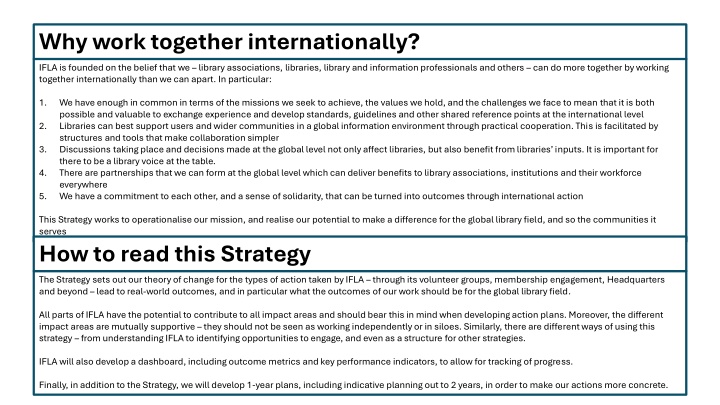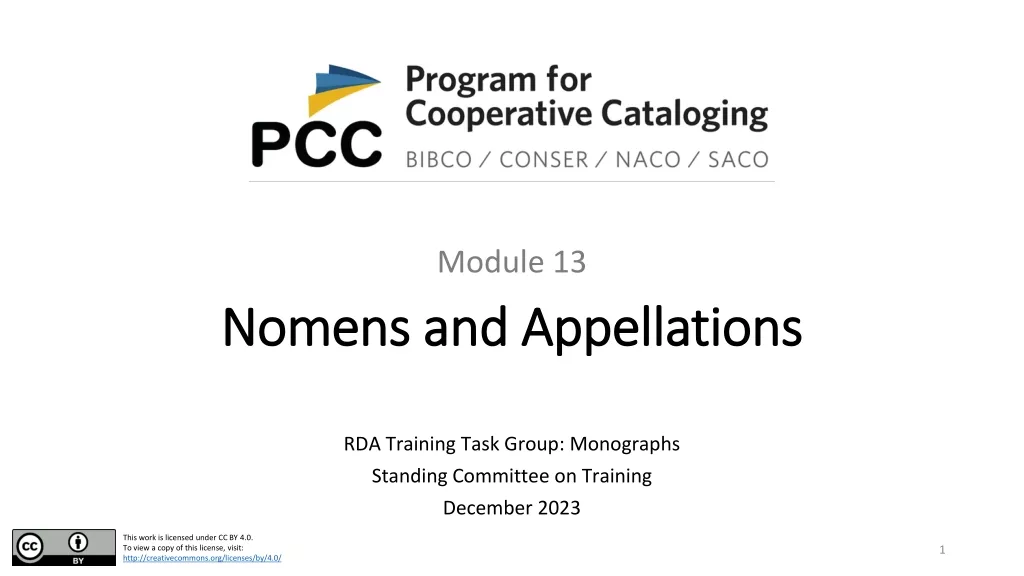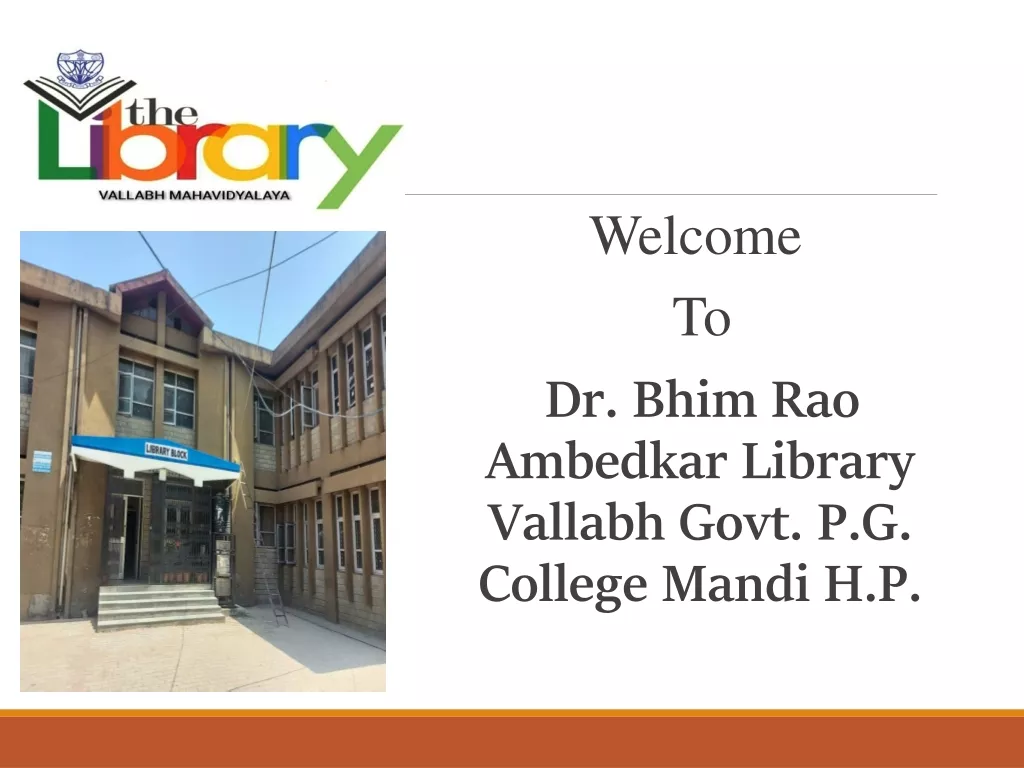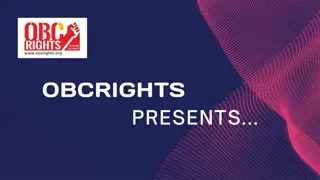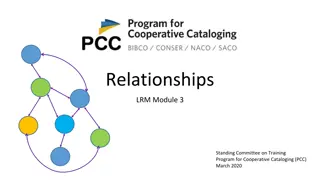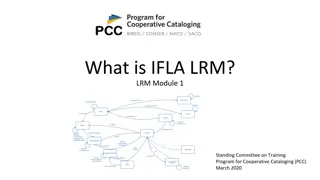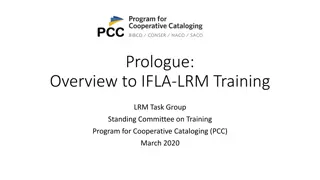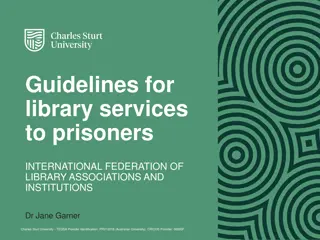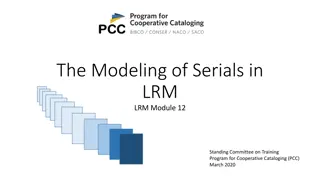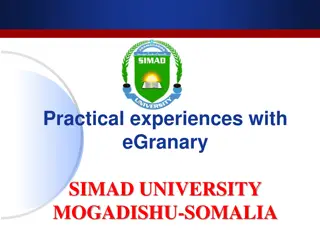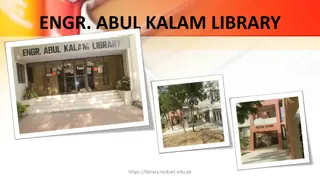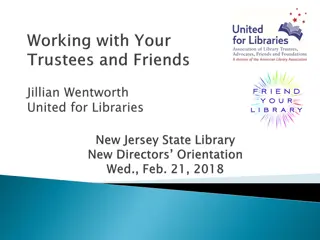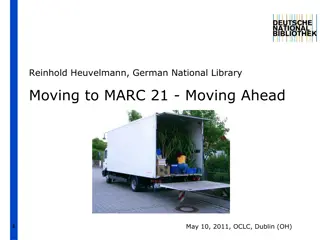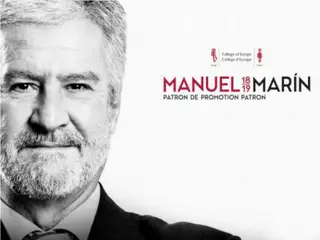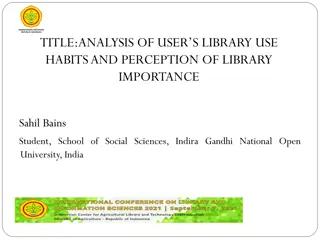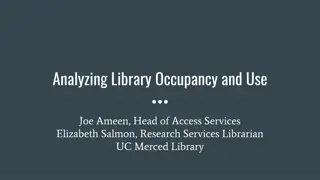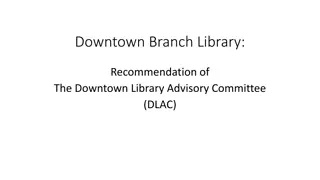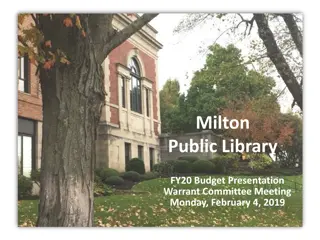Working Together Internationally: IFLA's Vision for Global Library Engagement
IFLA emphasizes the value of international collaboration among library associations, libraries, and information professionals to exchange experiences, develop standards, and address common challenges. By working together, libraries can enhance user support, foster global information access, and advocate for libraries on a global scale. The strategy focuses on achieving sustainable futures through impactful engagement, innovative practices, capacity-building, and global networking.
Download Presentation

Please find below an Image/Link to download the presentation.
The content on the website is provided AS IS for your information and personal use only. It may not be sold, licensed, or shared on other websites without obtaining consent from the author.If you encounter any issues during the download, it is possible that the publisher has removed the file from their server.
You are allowed to download the files provided on this website for personal or commercial use, subject to the condition that they are used lawfully. All files are the property of their respective owners.
The content on the website is provided AS IS for your information and personal use only. It may not be sold, licensed, or shared on other websites without obtaining consent from the author.
E N D
Presentation Transcript
Why work together internationally? IFLA is founded on the belief that we library associations, libraries, library and information professionals and others can do more together by working together internationally than we can apart. In particular: 1. We have enough in common in terms of the missions we seek to achieve, the values we hold, and the challenges we face to mean that it is both possible and valuable to exchange experience and develop standards, guidelines and other shared reference points at the international level Libraries can best support users and wider communities in a global information environment through practical cooperation. This is facilitated by structures and tools that make collaboration simpler Discussions taking place and decisions made at the global level not only affect libraries, but also benefit from libraries inputs. It is important for there to be a library voice at the table. There are partnerships that we can form at the global level which can deliver benefits to library associations, institutions and their workforce everywhere We have a commitment to each other, and a sense of solidarity, that can be turned into outcomes through international action 2. 3. 4. 5. This Strategy works to operationalise our mission, and realise our potential to make a difference for the global library field, and so the communities it serves How to read this Strategy The Strategy sets out our theory of change for the types of action taken by IFLA through its volunteer groups, membership engagement, Headquarters and beyond lead to real-world outcomes, and in particular what the outcomes of our work should be for the global library field. All parts of IFLA have the potential to contribute to all impact areas and should bear this in mind when developing action plans. Moreover, the different impact areas are mutually supportive they should not be seen as working independently or in siloes. Similarly, there are different ways of using this strategy from understanding IFLA to identifying opportunities to engage, and even as a structure for other strategies. IFLA will also develop a dashboard, including outcome metrics and key performance indicators, to allow for tracking of progress. Finally, in addition to the Strategy, we will develop 1-year plans, including indicative planning out to 2 years, in order to make our actions more concrete.
Vision: sustainable futures for all through knowledge and information How to achieve this: libraries, their workforce and their associations globally have the capability, contacts, confidence and resilience to realise their potential to drive sustainable development in a fast-evolving world Impactful engagement with stakeholders and communities The library and information workforce everywhere has the confidence, skills and resources to make the case for properly- supported libraries Innovative, effective, ethical professional practice The library and information workforce develops knowledge and accesses tools that maximise its ability to deliver on its missions for the public benefit Structures and capacity for delivering development goals The library and information workforce at all levels has the structures and networks necessary to collaborate for delivery and evaluate success What this means for the global library field Engagement in international librarianship represents a core pillar of the work of library associations, libraries and thelibrary and information workforce Vibrant global, professional communities Diverse, high-performing volunteer groups Dynamic communities of practice offering rich involvement possibilities A broad, engaged membership World-class standards Spaces and places to connect Libraries are recognised, represented and valued as partners Effective drive to secure recognition of and support for libraries in international spaces A wide and constructive network among partners and stakeholders Strong values, thought leadership Libraries are enabled to deliver meaningful change at all levels Regional structures enable a strong regional voice, articulated workplans, and coordinated action Relevant and impactful training Support for associations and wider fields as infrastructures for change What IFLA will do to make this happen Enabler: Future-proofing IFLA Partnership building and management/Transparency and good governance/efficient delivery/well-managed HQ/impact focus/sustainability MEASURES OF SUCCESS
Impact Area 1: Vibrant, global professional communities Crucial to our ability to deliver change is our community of members and volunteers. We are uniquely placed, as the global organisation for libraries, to provide a space and support for exchange, learning and inspiration, as well as the development of relevant standards and guidelines. Through this, we help libraries everywhere provide the best possible service to their communities, as well as to realise the possibilities created by being part of a global organisation. Our work here involves: Enabling dynamic and high-performing volunteer groups, acting as spaces for learning, and incubators for new ideas Maintaining and expanding an engaged membership which contributes experience and energy to the field Developing active and engaged wider communities, allowing all members of our field to find their place in our work Upholding and creating world-class standards and guidelines that facilitate continuous evolution and international working What this means for the global library field Libraries and library and information workforce everywhere benefit from a wide variety of opportunities to learn, develop and contribute to development, as well as relevant, accessible tools. Collectively, we can work together, connecting institutions, collections and services to realise further the goal of international access to information. We know that we have succeeded if Our volunteer groups develop and deliver actions which enhance the field s ability to deliver change. Our membership grows, in particular in areas where we are currently under-represented, and members not only engage actively, but also apply and share the results of their engagement in IFLA. High-quality and up-to-date standards are actively used by libraries around the world. To monitor progress, we use the following measures: Net promoter scores among members; downloads of IFLA standards and materials, and user survey results; volunteer experience surveys; measures of diversity among volunteers; measures of capabilities and confidence among volunteers.
Impact Area 2: Libraries are recognised, respected and valued as partners everywhere We will can only realise the potential of libraries to change society if we can secure the laws and resources we need, through effective advocacy and partnership-building. This requires coordinated work at all levels, from strong and broad recognition of the role of libraries in global policy spaces to enabled and empowered libraries at the local level. We also need to be a strong partner, able to speak the language of other stakeholders. Our work here involves: Building a voice, profile and influence in relevant international policy spaces where IFLA is uniquely able to contribute Identifying and developing partnership strategies with others, in line with our strategy and as a means of achieving shared goals Providing thought-leadership within the field on policy issues and promoting library values Ensuring that advoacy resources and skills are spread throughout the field, to realise the impact of our global work What this means for the global library field The global voice of libraries is strong, and libraries and library and information workforce everywhere can draw on our successes at the global level in their own advocacy and partnership-building, as well as engage effectively in international activities. They can draw on IFLA work in defining and upholding library values, as well as resources to help become confident advocates for libraries. We know that we have succeeded if We see library priorities recognised in key global texts such as the UN post-2030 agenda. Our community is regularly using materials and opportuities created by IFLA to enhance advocacy and partnerships work (and can talk partners language), and has a stronger sense of agency. Library values, including intellectual freedom and open science, are reflected in law and policy. To monitor progress, we use the following measures: Measures of library references in key texts; proactive approaches to libraries by intergovernmental organisations; number of actions carried out in partnership with others; use of IFLA policy work; uptake of advocacy materials (measured through surveys)
Impact Area 3: Libraries enabled to deliver meaningful change at all levels While each library focuses on the needs of the individuals and communities they serve, collectively, libraries have a unique potential to drive systemic change in the areas in which we work. To do this, we need the structures and skills necessary to design, deliver, and evaluate projects, programmes and initiatives which lead to positive change. IFLA is uniquely placed to support in this work, through its global reach and the expertise and networks we can mobilise. Our work here involves: Developing regional structures which are able both to articulate global priorities at their level, and build high-impact work programmes around specific needs within the context of IFLA s wider strategy Developing an offer of relevant training which adds value to existing provision and responds to identified areas of need Supporting the development of library associations, in the context of a wider effort to build impactful library fields What this means for the global library field Libraries, and the library and information workforce everywhere have stronger structures at all levels enabling resilience in the face of change, creating possibilities for engagement and exchange, as well as to get involved in projects that lead to systemic change in their societies. They also benefit from a stronger range of support for their work. We know that we have succeeded if We have developed a stronger regional profile, with relevant committees and offices having a track record of impactful projects. We also have a suite of training activities, in particular around building impact, that offer lessons that are taken up in participants practical work. We can demonstrate a strengthening of library associations, as well as of library fields, in terms of delivery ability. To monitor progress, we use the following measures: Member survey views on the work of regional structures; projects launched with external partners at the regional level; range, uptake, completion and follow-up of training courses; library associations taking relevant action for impact and sustainability.
Enabler: Future-proofing IFLA IFLA is uniquely placed, through our global reach, member and volunteer community, and relationship with global players to play the roles set out in this Strategy. To do this into our second century, we need to focus continually on how we can deliver most effectively for our members and partners alike. Thorugh this, we can ensure a virtuous circle, enabling us ever better to achieve our goal of delivering progress through libraries, sustainably. Our work here involves: Ensuring that our governance is effective, transparent and fit-for-purpose, giving all parts of our community a voice Ensuring that we are effective, reliable and sustianable in delivering projects and initiatives, in particular in partnerships Continuing to invest in our Headquarters team so that they can respond to community needs and build for the future Developing and implementing a successful sustainability strategy that allows us to diversify funding and deliver on our goals What this means for the global library field Libraries and library and information workforce everywhere can continue to count on IFLA to provide a space for professional exchange, a voice for libraries globally, and a source of training and opportunities to enhance their own work. Engagement in IFLA becomes a path to getting involved in exciting and innovative projects that bring a wider variety of benefits. We know that we have succeeded if IFLA s member and volunteer communities have a strong understanding of what IFLA is and can offer, and value this. We have a portfolio of successfully delivered projects, leading to long-term relations with funders and other patners. We have a dynamic and motivated HQ team, able to respond effectively and innovatively to community needs To monitor progress, we use the following measures: Member survey feedback and net promoter scores; successfully delivered projects; staff survey feedback evolutions over time; number of strategic partnerships (and growth)
